
Earl of Derby is a title in the Peerage of England. The title was first adopted by Robert de Ferrers, 1st Earl of Derby, under a creation of 1139. It continued with the Ferrers family until the 6th Earl forfeited his property toward the end of the reign of Henry III and died in 1279. Most of the Ferrers property and the Derby title were then held by the family of Henry III. The title merged in the Crown upon Henry IV's accession to the throne in 1399.

Baron Alvingham, of Woodfold in the County Palatine of Lancaster, is a title in the Peerage of the United Kingdom. It was created on 10 July 1929 for Robert Yerburgh. He had previously represented Dorset South in the House of Commons as a Conservative. His father, Robert Yerburgh, had earlier represented Chester in Parliament. In 1916, Royal approval was given to a peerage to whom he had been signified, but he died before the patent was issued. The first Baron's son, the second Baron, who succeeded his father in 1955, served in the Coldstream Guards and retired in 1981 as a Major-General and Director of Army Quartering. As of 2020 the title is held by his son, the third Baron, who succeeded his father in that year.
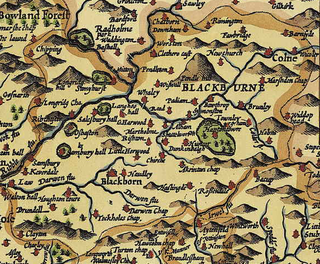
Blackburn Hundred is a historic sub-division of the county of Lancashire, in northern England. Its chief town was Blackburn, in the southwest of the hundred. It covered an area similar to modern East Lancashire, including the current districts of Ribble Valley, Pendle, Burnley, Rossendale, Hyndburn, Blackburn with Darwen, and South Ribble.

Lancashire is a county of England, in the northwest of the country. The county did not exist in 1086, for the Domesday Book, and was apparently first created in 1182, making it one of the youngest of the traditional counties.

Thwaites Brewery is a regional brewery founded in 1807 by Daniel Thwaites in Blackburn, Lancashire, England, now located near Mellor in the Ribble Valley. Part of the company was sold to Marston's in 2015, and the original brewery was demolished in 2019. Thwaites still produces beer on a smaller scale.

James Stanley, 7th Earl of Derby, KG was an English nobleman, politician, and supporter of the Royalist cause in the English Civil War. Before inheriting the title in 1642 he was known as Lord Strange. He was feudal Lord of the Isle of Man, where he was known as "Yn Stanlagh Mooar".
Daniel Thwaites was an English brewer and a Conservative Party politician from Blackburn in Lancashire. He owned what is now Thwaites Brewery, and sat in the House of Commons from 1875 to 1880.
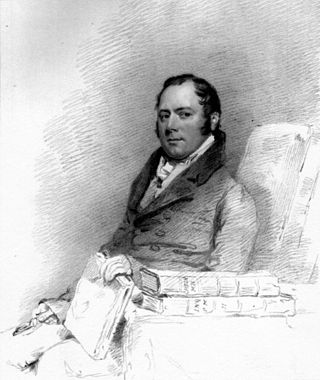
George Ormerod was an English antiquary and historian. Among his writings was a major county history of Cheshire, in North West England.
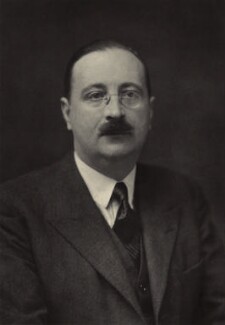
Robert Daniel Thwaites Yerburgh, 1st Baron Alvingham was a British Conservative politician.

Robert Armstrong Yerburgh,, was a British barrister and Conservative politician.
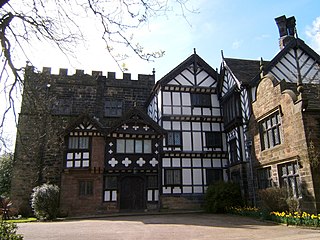
Turton Tower is a manor house in Chapeltown in North Turton, Borough of Blackburn with Darwen, Lancashire, England. It is a scheduled ancient monument and a Grade I listed building.
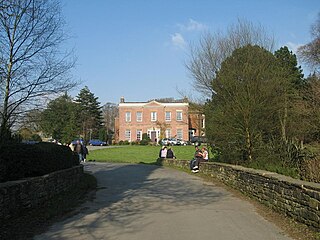
Rivington Hall is a Grade II* listed building in Rivington, Lancashire, England. It was the manor house for the Lords of the Manor of Rivington. The hall is of various builds as successor to a 15th-century timber-framed courtyard house that was built near to the present building of which no trace remains. It is a private residence.
The Chetham Society "for the publication of remains historic and literary connected with the Palatine Counties of Lancaster and Chester" is a text publication society and registered charity established on 23 March 1843.

Robert de Gresle (1174–1230) was a Lord of the manor of Manchester, the first of his family to take up residence in Manchester. Initially the Gresle family, were absentee landlords, living elsewhere, with Stewards to represent them locally.

Elma Amy Yerburgh was a member of the Thwaites family who was owner and then chairman of the Thwaites Brewery company from 1888 to 1946. She was the daughter of Daniel Thwaites, M.P. for Blackburn, and was married to Robert Yerburgh, M.P. for Chester. In the town of Blackburn she was known for her generosity to the company's workers and as a public benefactor, who helped fund the construction of the War Memorial wing to Blackburn Royal Infirmary and helped found the town's Empire Theatre, now named after her. Her name was also commemorated in "Elma's Pound", a beer specially brewed by Thwaites Brewery for Christmas 2007 to celebrate their 200th anniversary.
Billinge Scar was a 19th-century country house near Blackburn, Lancashire, England.
John Rushton (1798-1868) was Archdeacon of Manchester from 1843 until 1854.

Canon Oswald Pryor Wardell-Yerburgh, until 1889 known as Oswald Pryor Yerburgh, was a Church of England clergyman who held numerous offices.
Owen Ashmore was a British industrial archaeologist at the University of Manchester who was Secretary and Vice-President of the Lancashire and Cheshire Antiquarian Society, Treasurer of the Chetham Society and a Fellow of the Society of Antiquaries.
William Ecroyd Farrer was an English historian and genealogist.

















